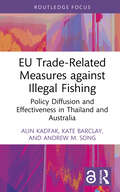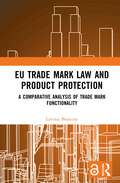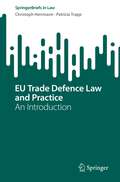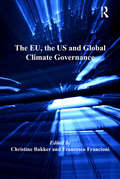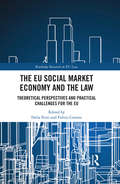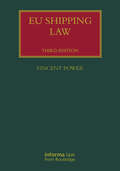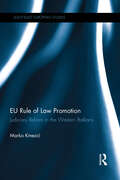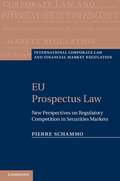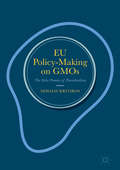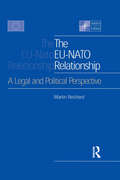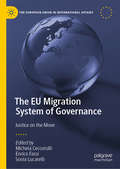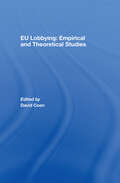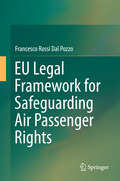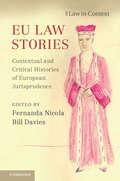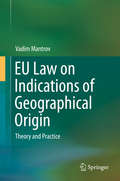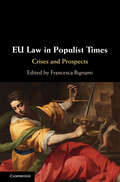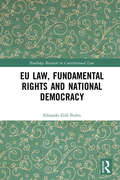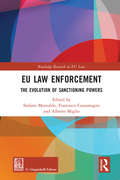- Table View
- List View
EU Trade-Related Measures against Illegal Fishing: Policy Diffusion and Effectiveness in Thailand and Australia (Routledge Focus on Environment and Sustainability)
by Andrew M. Song Kate Barclay Alin KadfakFocusing on the experiences of Thailand and Australia, this book examines the impact of trade-restrictive measures as related to the EU’s regulations to prevent Illegal, Unreported and Unregulated (IUU) fishing. It is widely accepted that IUU fishing is harmful, and should be stopped, but there are different approaches to tackling it. Acknowledging this, this book argues that major efforts to fight IUU fishing require careful analyses if the goal is to achieve optimal results and avoid unintended consequences. The book draws on the recent experiences of Thailand and Australia to offer an empirical examination of one increasingly prominent solution, trade-restrictive measures. With Thailand representing direct, active intervention by the EU and Australia a more indirect dispersion of policy narratives and discourses, the book provides a rounded view on how likely it is that different countries in different situations will adapt to the changing policy norms regarding IUU fishing. Understanding the reactions of countries who might be targeted, or otherwise be influenced by the policy, generates new knowledge that helps inform a more effective and scalable implementation of the policy on the part of the EU and a better governance preparedness on the part of non-EU fishing nations. In broader terms, this book exposes a key moment of change in the compatibility between environmental regulations and international trade. The EU IUU policy is a prime example of a policy that uses the mechanisms of international trade to account for environmental and conservation objectives. By way of the unilateral and trade-restrictive stance against IUU fishing, the EU has positioned itself as a major market and normative power, driving its sustainability norms outwards. This book sheds light on the efficacy of this policy setup based on the analysis of country perspectives, which is a key factor influencing its potential spread. This book will be of interest to students and scholars of international fisheries politics, marine conservation, environmental policy and international trade, and will also be of interest to policymakers working in these areas.
EU Trade Mark Law and Product Protection: A Comparative Analysis of Trade Mark Functionality
by Lavinia BrancusiThis book employs scholarly analysis to ground practical tools for applying the EU Trade Mark law (EUTM) functionality refusal grounds to address business needs when registering trade marks consisting of product characteristics. The study comprehensively examines the absolute grounds for a refusal of registration of functional signs under EUTM. It interprets the functionality refusal grounds through objective tests, focusing on the pro-competition rationale of denying trade mark exclusivity on product features that are technically or aesthetically important for competitors’ ability to trade in alternative products. The work takes a comparative approach looking at the US trade dress functionality doctrine, and a law and economics perspective on the role of trade marks and brands in the marketplace. It explores how competition rules related to market definition and the substitutability of products, as well as marketing and design findings related to branding and aesthetics, could be integrated into the legal assessment of EUTM functionality. The volume will be of interest to academics and researchers working in the areas of Intellectual Property Law, Trade Mark and Design Law, EU Law, Comparative Law, and Branding.
EU Trade Defence Law and Practice: An Introduction (SpringerBriefs in Law)
by Christoph Herrmann Patricia TrappThe European Union is one of the most outward-oriented economies in the world, and free trade is one of its founding principles. As such, instruments intended to ensure that international trade is conducted on a level playing field have been part of the EU’s policy toolbox since the beginning of European integration. Adapting to the current changes in international trade, these instruments have since undergone major reforms. This work provides an overview of the EU’s legal framework on the use of its trade defence instruments, in particular measures under the Trade Barriers Regulation, the Basic Anti-Dumping Regulation and the Basic-Anti Subsidy Regulation. The book shares valuable insights into how EU institutions currently apply these instruments and places their application in the broader political context in which international trade takes place, which has been shaped e.g. by developments related to the United Kingdom’s withdrawal from the EU and the ongoing blockade of the WTO Appellate Body.
The EU, the US and Global Climate Governance
by Christine Bakker Francesco FrancioniThis volume presents a critical analysis of transatlantic relations in the field of environmental governance and climate change. The work focuses on understanding the possible trends in the evolution of global environmental governance and the prospects for breaking the current impasse on climate action. Drawing on research involving experts from eleven different universities and institutes, the authors provide innovative analyses on policy measures taken by the EU and the US, the world’s largest economic and commercial blocs, in a number of fields, ranging from general attitudes on environmental leadership with regard to climate change, to energy policies, new technologies for hydrocarbons extraction and carbon capture, as well as the effects of extreme weather events on climate-related political attitudes. The book examines the way in which the current attitudes of the EU and the US with regard to climate change will affect international cooperation and the building of consensus on possible climate policies, and looks to the future for international environmental governance, arguably one of the most pressing concerns of civilisation today. This book, which is based on research carried out in the context of the EU-financed FP7 research project TRANSWORLD, will appeal to academics, policy makers and practitioners seeking a deeper understanding of the challenges resulting from climate change.
The EU Succession Regulation
by Calvo Caravaca Alfonso-Luis Angelo Davì Mansel Heinz-PeterThe European Succession Regulation is a landmark in the field of EU private international law. It unifies the conflicts of laws, jurisdiction and recognition of foreign judgments and some other legal instruments in the field of succession and wills. This volume provides an article-by-article commentary on the individual provisions of the Regulation, introduced by an overview of its general framework and underlying principles. As a reference tool for the Regulation, this book is intended to promote a high standard of interpretation and application. With contributions from leading scholars in the field, it uses a comparative approach in its analysis to enrich the academic debate and highlight the problems likely to arise in the practical application of the Regulation.
EU Sports Law and Breakaway Leagues in Football
by Katarina PijetlovicKatarina Pijetlovic is the first author to address the issue of breakaway leagues in football and their treatment under EU law. In this book she guides the reader through EU sports law, the specificities of the sporting industry and the problems and power struggles in European football governance in the context of the breakaway threats by elite clubs. In order to analyse the legality of UEFA clauses that restrict the formation of such breakaway structures, the author first provides a progressive interpretation of the applicable EU sports law and an in-depth analytical review of EU sports cases decided under internal market and competition provisions, including a novel perspective on the UEFA home-grown rule and the Bosman case. Thereafter, she sets out an original theory of convergence between TFEU provisions on competition and the internal market in the light of sporting exceptions. Finally, in applying the legal principles thus outlined Katarina Pijetlovic explores the legality of the restrictive UEFA clauses and the case for the formation of alternative leagues in European football under EU sports law. A number of surprising outcomes emerge from this analytical process. Conversely, she also tests the largely neglected issue of the legality of forming a breakaway league by the European elite football clubs. The systematic way in which the reader is guided through EU sports law and the legal issues under consideration makes the book accessible for EU lawyers as well as non-EU sports lawyers, on both an academic and a practitioner's level. Katarina Pijetlovic holds licentiate and doctoral degrees in EU sports law from the University of Helsinki. The book appears in the ASSER International Sports Law Series, under the editorship of Dr. David McArdle, Prof. Ben Van Rompuy and Marco van der Harst LL. M.
The EU Social Market Economy and the Law: Theoretical Perspectives and Practical Challenges for the EU (Routledge Research in EU Law)
by Delia Ferri Fulvio CorteseInvestigating the extent to which the European Union can be defined as a "highly competitive social market economy", this edited collection illustrates and tests the constitutional reverberations of Art. 3(3) of the Treaty on the European Union, and discusses its actual and potential transformative effect. In the aftermath of Brexit, and in the 60th anniversary of the Treaty of Rome, the book is particularly timely and topical, offering new and deeper insights on the complex and constantly evolving social dimension of the EU, ultimately reflecting on how the objective of (re)constituting the EU as a "highly competitive social market economy" might best be achieved.
EU Shipping Law (Lloyd's Shipping Law Library)
by Vincent PowerA previous winner of the Comité Maritime International’s Albert Lilar Prize for the best shipping law book worldwide, EU Shipping Law is the foremost reference work for professionals in this area. This third edition has been completely revised to include developments in the competition/antitrust regime, new safety and environmental rules, and rules governing security and ports. It includes detailed commentary and analysis of almost every aspect of EU law as it affects shipping.
EU Rule of Law Promotion: Judiciary Reform in the Western Balkans (Southeast European Studies)
by Marko KmezicDo EU institutions have an influence on the implementation of the rule of law in potential candidate countries and, if so, of what kind? During the compliance monitoring process related to the effective rule of law and democracy the EU Commission tests and criticizes the effectiveness of the judiciary and strengthens the rule of law in preparation for accession. In the Western Balkans this was a process fraught with difficulties. Despite the fact that academic scholarship and democratic politics agree on rule of law as a legitimizing principle for the exercise of state authority, there is no uniform European standard for institution-building or monitoring activities by the EU in this area. With focus on the reform of the judiciary in five case study countries of Bosnia and Herzegovina, Kosovo, Macedonia, Montenegro, and Serbia, this empirical research investigates the EU's transformative power with regard to the effectiveness of rule of law and judicial sector reform in its infancy. It analyses the depth and limitations of EU rule of law promotion in the Western Balkans and presents policy recommendations intended to address the shortcomings in judiciary reform. This book aims to fill the gap in the existing academic scholarship of EU politics, law and Western Balkans literature.
The EU Race Directive: Developing the Protection against Racial Discrimination within the EU
by Erica HowardIn 2000, the European Union adopted a Directive against discrimination on the grounds of racial or ethnic origin. This book provides an in-depth evaluation of the Race Directive and its effects, questioning how successful the Race directive has been. The EU Race Directive discusses the history of the fight against racial discrimination in the EU and the equality clauses in international Human Rights instruments. It then examines the terms race, racism and racial discrimination and equality in the Directive. The book also looks at the concepts of equality which can be distinguished in the Race Directive and in the subsequent developments at EU level. Examining whether the Directive has improved the protection against racial or ethnic origin discrimination for people within the EU, the book concludes with an assessment of how far the EU has come on the road to racial equality with the adoption of the Race Directive and the subsequent developments. It also contains proposals for possible improvements. The comprehensive and up-to-date analysis in this book goes beyond most other books written on the subject and the specific focus on racism and racial discrimination means a more thorough examination than most texts focusing on discrimination on a larger number of grounds. This book will be of great value to students and academics in (European) law, social sciences and human rights, researching racism, racial discrimination, ethnicity and race relations. It will also be useful for policy makers.
EU Prospectus Law
by Pierre SchammoPierre Schammo provides a detailed analysis of EU prospectus law (and the 2010 amendments to the Prospectus Directive) and assesses the new rules governing the European Securities and Markets Authority, including the case law on the delegation of powers to regulatory agencies. In a departure from previous work on securities regulation, the focus is on EU decision-making in the securities field. He examines the EU's approach to prospectus disclosure enforcement and its implementation at Member State level and breaks new ground on regulatory competition in the securities field by providing a 'law-in-context' analysis of the negotiations of the Prospectus Directive.
EU Promotion of Human Rights for LGBTI Persons in Uganda: Translating and Organizing a Wicked Problem
by Lydia MalmedieExamining the EU's promotion of human rights for lesbian, gay, bisexual, trans+ and intersex (LGBTI) persons in Uganda during the period of 2009 to 2017, this book investigates how a public administration defines and deals with a wicked problem. The empirical puzzle of how the topic of human rights for LGBTI persons, despite its highly contested nature, travelled between Brussels and Kampala, became codified in form of LGBTI Guidelines (2013) and institutionalized within EU foreign policy is addressed as one of translation and sensemaking. The investigation focuses on the process of problem definition in everyday practice by EU staff and EU member states’ staff in Brussels and Kampala. This book therefore provides key insights into how public administrations deal with wicked problems, how contested ideas can become institutionalized and how an idea is translated and made sense of across time, levels and cultural boundaries. The findings are of interest especially to scholars of wicked problems, sociological new institutionalism and public administration as well as international relations and EU studies, human rights, gender and sexuality studies.
EU Private Law and the CISG: The Effects for National Law
by Zvonimir Slakoper Ivan TotEU Private Law and the CISG examines selected EU directives in the field of private law and their effects on the national private law systems of several EU Member States and discusses certain specific concepts of the United Nations Convention on Contracts for the International Sale of Goods (CISG) in light of the CISG’s recent fortieth anniversary. The most prominent influence of EU law on national private law systems is in the area of the law of obligations, thus the book focuses on several EU private law directives that cover the issues belonging to contract and tort law, as interpreted in the case law of the Court of Justice of the EU. EU private law concepts need to be interpreted autonomously and uniformly rather than through the lens of national private law systems. The same is true for the CISG which has not only been one of the most successful instruments of the international trade law unification but had also influenced both the EU private law and domestic laws. In Part I, focused on the EU private law and its effects for national laws, chapters examine the recent Digital Content and Services Directive and its likely impact on the contract law of the UK and Ireland, the role aggressive commercial practices play in EU banking and credit legislation, the applicability of the EU private international law rules to collective redress, the unfair contract terms regime of the Late Payment Directive and its transposition into Croatian law, the implementation of the Commercial Agency Directive in Denmark, Estonia and Germany, and disgorgement of profits as remedy provided in the Trade Secrets Directive. In Part II, dealing with selected CISG issues, chapters discuss the autonomous interpretation of CISG’s concept of sale by auction and its notion of intellectual property, as well as the CISG’s principle of freedom of form and the possibility for reservations with the effect of its exclusion. The book will be of interest to legal scholars in the field of EU private law and international trade law, as well as to the students, practitioners, members of law reform bodies, and civil servants in Europe, and beyond.
EU Policy-Making on GMOs
by Mihalis KritikosThis book examines the development and implementation of the EU's legislative framework on the commercial release of GMO products as a case study of social regulation operating within a predominantly technical framework. The analysis and findings are based on an extensive documentary analysis and interviews with regulators, risk assessors, public interest groups and biotechnology experts at the national and European levels. It argues that in the case of the EU biotechnology framework, the particular institutional settings created for the formulation and interpretation of its provisions have been of decisive importance in elaborating a proceduralised 'science-based' prior authorization scheme as the preferred framework for granting commercial permits. This interdisciplinary work will appeal to EU lawyers, decision-makers and risk managers as well as academics working in the fields of EU studies, politics, law, risk governance sociology of science/risk and technology assessment. The book is based on a PhD thesis that was awarded with the 2008 UACES Prize for the Best Thesis in European Studies in Europe and with the EPEES 1st Prize for the Best Thesis written by a Greek Researcher between 2004 and 2008.
EU Policy and Legal Framework for Artificial Intelligence, Robotics and Related Technologies - The AI Act (Law, Governance and Technology Series #53)
by Nikos Th. NikolinakosArtificial Intelligence (AI) can benefit our society and economy, but also brings with it new challenges and raises legal and ethical questions. According to the author of this comprehensive analysis, it is imperative to ensure that AI is developed and applied in an appropriate legal and regulatory framework that promotes innovation and investment and, at the same time, addresses the risks associated with certain uses of AI-related technologies.Essential to understanding the relationship between policy and law, this book traces the evolution of EU policy on artificial intelligence and robotics, focusing in particular on the EU’s ethical framework for AI, which defines trust as a prerequisite for ensuring a human-centric approach.The main part of the book provides a thorough and systematic analysis of the Commission’s 2021 proposed AI Act, which establishes harmonised rules for the development, placement on the market and use of AI systems in the EU. The author painstakingly compares the Commission’s proposed AI Act with the numerous “compromise” proposals of the Council of the European Union, leading to the final version of the Council’s AI Act (general approach) and its formal adoption on 6 December 2022. The author also examines with extraordinary detail the amendments proposed by the relevant committees and political groups of the European Parliament, revealing the position the Parliament is likely to adopt in the forthcoming negotiations with the Commission and the Council on the text of the AI Act.Numerous legislative and policy documents are presented in detail, while the analysis also considers the comments made by all interested parties (e.g. the European Commission, Council of the European Union, European Parliament, governmental organisations, national competent authorities, and stakeholders/actors with different/conflicting interests, such as corporations, business and consumer associations, civil society and other non-profit organisations). In the course of its in-depth analysis, this book will provide readers with crucial insight into the reasons behind the European Institutions’ different approaches and the often contradictory interests of stakeholders. Because the policy arguments are carefully balanced and drafted with scrupulous care, this volume will establish itself as a reference resource to be consulted for years to come.
EU Peacebuilding Missions: Developing Security in Post-conflict Nations (Palgrave Studies in Compromise after Conflict)
by Kieran DoyleThis book explores the EU's approach to peacebuilding and questions the EU global role as crisis manager and capacity builder. It highlights the significant contributions of the EU to civilian peacebuilding and also critically evaluates the activities of the EU Common Security and Defence Policy (CSDP) within their rule of law and human rights peacebuilding missions. It draws on the author's twenty years of experience working on CSDP and EU defence matters including his research on EU police missions in Africa and Middle East. It exposes emergent tension between peacebuilding in its neighbourhood and security issues. It examines the practice of EU peacebuilding including performance of its missions and how deployed personnel can professionalise their diplomatic (mediation, negotiation and dialogue facilitation) capacity to fully realise the potential of missions and exploit opportunities for expanding the vision of peace. It formulates convincing policy recommendations for the future planning of EU external relations in post conflict environments and offers valuable insights into how to connect with people and communities in the aftermath of conflict.
The EU-NATO Relationship: A Legal and Political Perspective
by Martin ReichardThe EU-NATO relationship continues to develop at a time of significant change for both organizations. Post 9/11, NATO embarked on a fundamental transformation, recasting itself as an organization with global strategic reach and interest, focused less on Europe than ever before. At the same time, the EU is also becoming a more global political actor. Consequently, there is growing evidence that over time the EU will take the primary place in providing military security in Europe. This volume combines political and legal methods to provide a comprehensive analysis of the current and likely future relationship between the EU and NATO. The work will be of interest to all those interested in the development of these two major organizations and international security more generally, whether from a political or legal perspective.
The EU Migration System of Governance: Justice on the Move (The European Union in International Affairs)
by Michela Ceccorulli Enrico Fassi Sonia LucarelliThis book explores the norms, practices, and main actors in the EU Migration System of Governance (EUMSG). Bringing a fresh perspective to the analysis of asylum and migration in Europe, the volume unpacks the European Union’s approach to migration and points to the principles and actions of EU member states. Moreover, it explores the EUMSG’s performance through the lenses of three alternative yet coexistent understandings of justice (non-domination, impartiality, and mutual recognition), thereby overcoming a unilateral ethical viewpoint and moving away from the ‘open-closed borders’ debate.
EU Lobbying (Journal Of European Public Policy Ser.)
by David CoenEU Lobbying: Empirical and Theoretical studies offers an analysis of large empirical studies of interest group politics and Lobbying in Europe. Recognising the continued European economic integration, globalisation and the changing role of the state, it observs significant adaptations in interest mobilisation and strategic behavour. This book assesses the logic of collective and direct action, the logic of access and influence, the logic of venue-shopping and alliance building. It addresses specific issues such as: the emergence of elite pluralism in EU institutions, the pump priming of political action by EU institutions, and the growing political sophistication of private and public interests in Brussels. Through these issues the book explores how interest groups lobby different European institutions along the policy process and how the nature of policy dictates the style and level of lobbying. This book was previously published as a special issue of Jounal of European Public Policy
EU Legal Framework for Safeguarding Air Passenger Rights
by Francesco Rossi Dal PozzoThis book presents a thorough analysis of the EU provisions and legal framework of passenger rights in the civil aviation field. It provides both a theoretical and practical view of the initiatives that have been taken in this field. This includes initiatives taken by the European Commission (EC) with the aim to improve the protection of passengers and by the European Court of Justice (ECJ) with regard to jurisprudence. The book points out the goals that have been obtained so far, as well as the goals that still need to be pursued. Particular attention is paid to EU institutions that have been created ad hoc to supervise aviation safety and harmonize the various safety procedures of the EU Member States. Recent and upcoming packages of important safety and security measures are examined in detail. The book gives examples of current applications of legislative instruments and presents readers with the tools to gain a deeper understanding of the legal, practical and theoretical aspects of this important topic in aviation.
EU Law Stories: Contextual and Critical Histories of European Jurisprudence (Law in Context)
by Bill Davies Fernanda NicolaThrough an interdisciplinary analysis of the rulings of the Court of Justice of the European Union, this book offers 'thick' descriptions, contextual histories and critical narratives engaging with leading or minor personalities involved behind the scenes of each case. The contributions depart from the notion that EU law and its history should be narrated in a linear and incremental way to show instead that law evolves in a contingent and not determinate manner. The book shows that the effects of judge-made law remain relatively indeterminate and each case can be retold through different contextual narratives, and shows the commitment of the European legal elites to the experience of legal reasoning. The idea to cluster the stories around prominent cases is not to be fully comprehensive, but to re-focus the scholarship and teaching of EU law by moving beyond the black letter and unravel the lawyering techniques to achieve policy results. Revealing context and stories behind leading European Court of Justice rulings, the book will appeal to students interested in understanding the making and the functioning of EU law through the eyes of many interlocutors of the Court, including winners and losers in each case. Retells stories by leading scholars or participants in the cases from a different perspective, and so the book reveals new insights, including lawyering techniques together with social and political contexts, into the established canon of EU law. By bringing together lawyers, historians, political scientists and political economists, the volume achieves original cross-disciplinary insights into the field of EU law.
EU Law on Indications of Geographical Origin
by Vadim MantrovThe present book examines both theoretical and practical aspects of the law on indications of geographical origin (IGOs) within the framework of European Union (EU) law, pursuing four distinct yet mutually related aims. First, it discusses theoretical issues of the law on IGOs including its historical foundations, terminology, principles of regulation, legal subjectivity, protection models and loss of protection. Second, it covers the EU law on IGOs from a systematic point of view. Particularly, the systematic review of the EU law on IGOs includes an in-depth analysis of and commentary on the relevant and applicable regulations. Third, it examines current legislative initiatives and further development options for the EU law on IGOs. Finally, it reveals the interrelation of the EU law on one hand and the national laws of EU Member States on the other with regard to IGOs, focusing on harmonized and non-harmonized areas of law.
EU Law in Populist Times: Crises and Prospects
by Francesca BignamiThe rise of Euroscepticism and populist backlash pose a dramatic challenge to the EU and highlight the EU's growing legal powers over core areas of state sovereignty. Authored by leading academics and policymakers, this book provides a comprehensive and cutting-edge analysis of the fields of EU law at the heart of contemporary political debates - economic policy, human migration, internal security, and constitutional fundamentals at the national level. Following the specialist contributions, the conclusion draws out critical, cross-cutting lessons for improving legitimacy and advancing the rule of law, rights and democracy in sovereignty-sensitive areas of EU law. Accessible to students, this volume is an invaluable resource for researchers and scholars of EU law and politics.
EU Law, Fundamental Rights and National Democracy (Routledge Research in Constitutional Law)
by Eduardo Gill-PedroThe orthodox view is that rights complement democracy. This book critically examines this view in the context of EU fundamental rights, specifically in situations where EU law requires member states to respect EU fundamental rights. It first sets out a legal theoretical account of how human rights can complement democracy. It argues that they can do so only if they are understood as both the conditions for the democratic process, and the outcome of such a democratic process. In light of this legal theoretical account of human rights, this book examines the demands which the Court of Justice of the EU (CJEU) imposes on the national orders in respect of EU fundamental rights. The conclusion reached is that the demands which EU fundamental rights impose on national legal orders entail a cost for the democratic legitimacy of those legal orders. Ultimately, accepting the demands of the CJEU in respect of EU fundamental rights may require the national legal order to abandon its commitment to protecting the human rights which are the foundation of the national legal order’s very legitimacy.
EU Law Enforcement: The Evolution of Sanctioning Powers (Routledge Research in EU Law)
by Stefano MontaldoThe existence of a structured enforcement system is an inherent feature of national legal orders and one of the core elements of State sovereignty. The very limited power to issue sanctions has often been deemed a gap in the EC legal order. Over the years, the situation has progressively changed. The Union’s institutional setting is growing in complexity and a variety of agencies has been or is expected to be endowed with law enforcement responsibilities. In addition, the so-called competence creep has led the EU to play an increasingly prominent role in several areas of EU law enforcement, including the issuing of sanctions. This book examines these developments, focusing on both the general features of the EU legal order and the analysis of key-substantive areas, such as banking and monetary union, environmental law, and data protection. The work thus presents a general framework for understanding EU sanctioning based on structural features and general legal principles. Part I develops an analytical framework, tracking the most significant evolutive patterns of EU sanctioning powers. Part II adopts a more practical approach focusing on specific issues and policy areas. The book bridges a gap in existing literature and sheds new light on the relationship between the exercise of jus puniendi and the evolution of EU integration.
